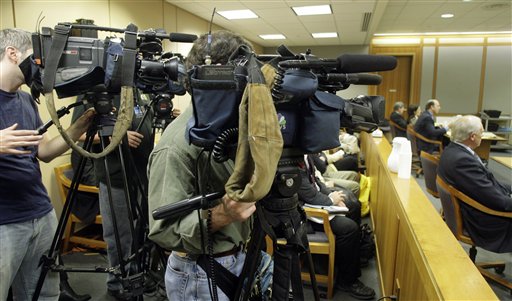The First Amendment’s language appears to provide a special right for the press, for what has been termed “the Fourth Estate” – the fourth unofficial branch of government that serves as the watchdog of a free society and monitors the official three branches of government.
After all, James Madison and the Framers approved a First Amendment containing a separate Press Clause – “or of the press.” Many scholars have pointed out that freedom of the press had special relevance and importance in the Founding era.
Does the press have access rights greater than the public?
However, the U.S. Supreme Court has taken a narrow view of the “Press Clause” and has held in a line of cases that the First Amendment does not provide the press any greater right of access than that of the general public.
For example, in Houchins v. KQED, Inc. (1978), the Court ruled that the First Amendment did not give the press the right to enter a jail to film. The Court wrote that “the media have no special right of access to the [jail] different from or greater than that accorded the public generally.”
Justice Potter Stewart advanced a different point of view in his concurring opinion in the decision. “That the First Amendment speaks separately of freedom of speech and freedom of the press is no constitutional accident, but an acknowledgment of the critical role played by the press in American society,” he wrote. “The Constitution requires sensitivity to that role, and to the special needs of the press in performing it effectively.”
Courts have recognized right of press to attend criminal trials
At times, the Court has recognized a right of press access, such as the right to attend criminal trials in Richmond Newspapers, Inc. v. Virginia (1980). However, the Court reasoned that by history and tradition both the press and the general public had a right to attend such trials, meaning that there was no special right of access for the press. The Court reasoned that “a presumption of openness inheres in the very nature of a criminal trial under our system of justice.” In other words, the Court framed the right of the press to attend a criminal trial as the right of the public’s access.
Scholars Patrick J. Charles and Kevin O’Neill criticize the Court’s approach in Richmond Newspapers of equating press access with the general right of public access: “Because the role of the press is to keep the public informed, individual members of the public will not likely undertake their own investigations of the prison system or other government institutions. So it makes no sense, under the Press Clause, to define press access in terms of public access.” (1070).
Thus, the modern U.S. Supreme Court has, in the words of scholar Sonya West, reduced the Press Clause to a “constitutional redundancy.” (8-9).
Part of the problem has been the Court’s trouble with determining exactly who is a member of the press. The Court struggled with this in the context of a journalist privilege to keep sources confidential in Branzburg v. Hayes (1972), writing: “The informative function asserted by representatives of the organized press in the present cases is also performed by lecturers, political pollsters, novelists, academic researchers, and dramatists. Almost any author may quite accurately assert that he is contributing to the flow of information to the public, that he relies on confidential sources of information, and that these sources will be silenced if he is forced to make disclosures before a grand jury.” This problem of defining the press is only exacerbated in an age of bloggers and citizen journalists.
To combat this definitional quandary, some have proposed coming up with a narrow definition of the press to distinguish the press from just any other speaker. Professor West concludes: “To rouse the Press Clause from its slumber, it is necessary to reject an overprotective approach and to embrace a narrow definition that separates a member of the press from an occasional public commentator.” (44).
David L. Hudson, Jr. is a law professor at Belmont who publishes widely on First Amendment topics. He is the author of a 12-lecture audio course on the First Amendment entitled Freedom of Speech: Understanding the First Amendment (Now You Know Media, 2018). He also is the author of many First Amendment books, including The First Amendment: Freedom of Speech (Thomson Reuters, 2012) and Freedom of Speech: Documents Decoded (ABC-CLIO, 2017).

